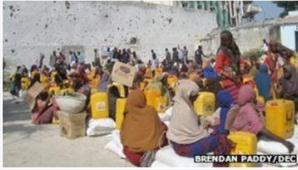Six months after famine struck the Horn of Africa, leaving 12 million people at risk of starvation, the situation in Somalia is still dire. Although the designation of famine in some areas of the country has been lifted, the Disasters Emergency Committee (DEC), a collaboration of 14 leading U.K. aid agencies, says that there are four million people still in urgent need of aid in a drought that has already killed tens of thousands.

The famine designation has been lifted in the Bay, Bakool and Lower Shabelle regions in southern Somalia, but rates of malnutrition and death remain extremely high. Throughout the rest of the country, millions of people continue to suffer despite £75 million (approximately USD $115 million) in aid money raised recently by the DEC. Many have been forced to abandon their homes, and flee to refugee camps.
Islamic Relief, one of the DEC’s member charities is calling for “more international aid and an increased diplomatic effort,” so that those displaced and affected by the famine can receive the food supplies and medical attention they need and finally begin to rebuild their lives.
Security is an added issue in the region. Militants known as al Shabab have taken over major cities and interfered with the delivery of emergency food and aid supplies. Government and African Union forces are fighting to rid the Shabab from the region, to finally achieve peace and stability in a time of great distress.
Because the situation in Somalia is given little attention from the media and international community, millions of people remain victim to immense suffering. The famine is far from over, and those affected need help and support now more than ever.
To find out more about how you can help those affected by famine, please go to: The World Food Programme, CARE, or UNICEF.
To read more about the famine in the Horn of Africa, please go to: The Continuing Famine in the Horn of Africa, Where is there a Famine? and Somalia’s Agony Tests Limits of Aid.
by Leah Baines

Danielle Nierenberg, an expert on livestock and sustainability, currently serves as Project Director of State of World 2011 for the Worldwatch Institute, a Washington, DC-based environmental think tank. Her knowledge of factory farming and its global spread and sustainable agriculture has been cited widely in the New York Times Magazine, the International Herald Tribune, the Washington Post, and
other publications.
Danielle worked for two years as a Peace Corps volunteer in the Dominican Republic. She is currently traveling across Africa looking at innovations that are working to alleviate hunger and poverty and blogging everyday at Worldwatch Institute’s Nourishing the Planet. She has a regular column with the Mail & Guardian, the Kansas City Star, and the Huffington Post and her writing was been featured in newspapers across Africa including the Cape Town Argus, the Zambia Daily Mail, Coast Week (Kenya), and other African publications. She holds an M.S. in agriculture, food, and environment from Tufts University and a B.A. in environmental policy from Monmouth College.








